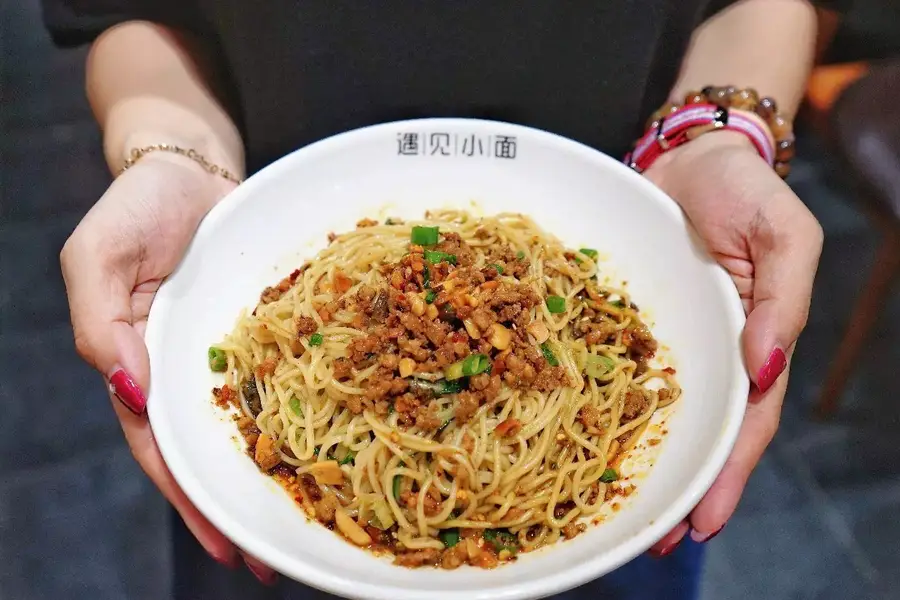Xiao Noodles serves up IPO plan to take its tangy taste global

The restaurant company wants to keep expanding its network of spicy Chongqing noodle shops, but price cuts may be eating into profits
Key Takeaways:
- The noodle chain more than doubled its revenue from 418 million yuan in 2022 to 1.15 billion yuan last year
- But the operator’s same-store sales slipped from 740 million yuan in 2023 to 709 million yuan last year
By Lee Shih Ta
Noodle dishes from Chongqing, famous for their spicy flavors in a fiery soup, are about to go on the menu for equity investors.
A fast-growing noodle shop chain that specializes in hot signature dishes from southwest China has filed to list its shares on the Hong Kong stock market, aiming to fund an expansion across more parts of the mainland and into overseas markets.
Guangzhou Xiao Noodles Catering Management Co. Ltd. started out as a local food outlet serving up bowls of noodles spiced with chili oil and Sichuan seasonings. It is now aiming to become the first chain of Chinese-style noodle shops to trade as a public company on the Hong Kong Stock Exchange.
The company bases its brand name on the Chongqing dish popularly known as “xiao mian”, or little noodles. The dining chain ranked as China’s biggest operator of Sichuan-Chongqing noodle restaurants by sales value last year and placed fourth in the general category of noodle shops, according to Frost & Sullivan data cited in the IPO application.
The company also claimed the top spot for offline sales of Chongqing noodles, noodles with peas and meat sauce and hot and sour sweet potato noodles for three consecutive years from 2022, according to the research report.
Although it owes its success to Chongqing’s tasty cuisine, the firm originated far away in Guangzhou, a southern city associated with milder flavors. Founder Song Qi was born in Heilongjiang province in northeastern China but left his hometown to study science in Guangzhou before obtaining a master’s degree from the Hong Kong University of Science and Technology. Later he became a trainee manager at a Hong Kong branch of the fast food chain McDonald’s.
Song once revealed in a media interview that from his very first McDonald’s meal he dreamed about one day starting his own brand and even challenging the supremacy of the U.S. burger giant.
Food science
He opened the first Xiao Noodles restaurant in 2014 with two other graduates from Guangzhou’s South China University.
A scientific mindset turned out to be an asset, helping the business to resolve a standardization challenge that had plagued chains selling Chinese-style noodles. Song studied the traditional craft of noodle making in Chongqing but was troubled by some of the approximate amounts and imprecise instructions. Instead, he set about quantifying ingredients and documenting steps in order to preserve the original taste while producing noodle dishes at scale.
Just three months after the first outlet opened, the business got an infusion of 2 million yuan ($274,132) in angel capital to fund upgraded operations. Meanwhile, the company set out to instill an appetite for its noodle dishes across the nation and around the clock, for breakfast, lunch or as a late-night snack, with some restaurants staying open 24 hours a day.
It built a presence in airports, railway stations, residential areas, shopping malls, college campuses and offices to cater to a range of diners.
By 2021, the company was valued at nearly 3 billion yuan after investments from Jiumaojiu (9922.HK), Best Food Holding under Lenovo’s Hony Capital, Country Garden and the dumpling chain XiJiaDe.
Even with its ample resources, the company did not reach the milestone of 100 stores until its seventh year of business. The brand branched out into a franchise model in 2019, adding another 100 stores in just two years between 2021 and 2023. By April this year, the chain comprised 374 restaurants across 22 cities on the Chinese mainland and six outlets in Hong Kong.
Revenue soared on the back of the rapid growth, going from 418 million yuan in 2022 to 1.15 billion yuan last year with a compound annual growth rate of around 66%, outpacing other Chinese-style noodle businesses in the past three years. It went from posting a loss of 35.97 million yuan in 2022 to reporting a 45.91 million yuan profit a year later, rising to 60.70 million yuan in 2024.
Price trade-off
At the end of last year, the chain was operating 360 outlets, 80% of them in first-tier cities. Breaking that down by business model, 279 were owned by the company and 81 were franchises. The shops owned by the chain remained the main revenue driver, accounting for 86.7% of turnover in 2024.
While earnings and profits have been growing, the risk of expanding too quickly remains real, amid an uncertain outlook for the Chinese economy and fragile consumer confidence. The company’s accounts were in the black for the past two years but profit per store dropped from 182,000 yuan to 169,000 yuan. Xiao Noodles earned 60.70 million yuan in profit last year on 42.09 million orders, equivalent to just 1.4 yuan per order.
Same-store sales also dropped from 740 million yuan in 2023 to 709 million yuan last year, falling 4.2% nationwide and 5.14% in first-tier cities.
Other metrics are also flashing danger signs. Average spending per order dropped from 36.1 yuan in 2022 to 32 yuan in 2024 after the company cut its prices to lure in more customers.
Rapid expansion has strained the corporate finances, with net current liabilities surging from 148 million yuan in 2022 to 242 million yuan, and just 42.19 million yuan of cash left on hand.
In response, Xiao Noodles has decided to expand its reach, venturing into lower-tier Chinese cities and targeting international markets such as Singapore, as well as scaling up its franchise network. As it prepares to face the scrutiny of Hong Kong investors, the company has changed its advertising slogan from “sharing the delight of Xiao Noodles outside Chongqing” to “sharing the delight of Chongqing noodles across the globe”.
The staple bowl of steaming noodles is a cutthroat business in China, with stiff competition from the likes of Hefu Noodles, Wuyebanmian and Mr. Lee California Beef Noodle.
To succeed in its expansion strategy, Xiao Noodles will need to keep satisfying a widening base of customers with its selection of spicy dishes.
To subscribe to Bamboo Works weekly free newsletter, click here





